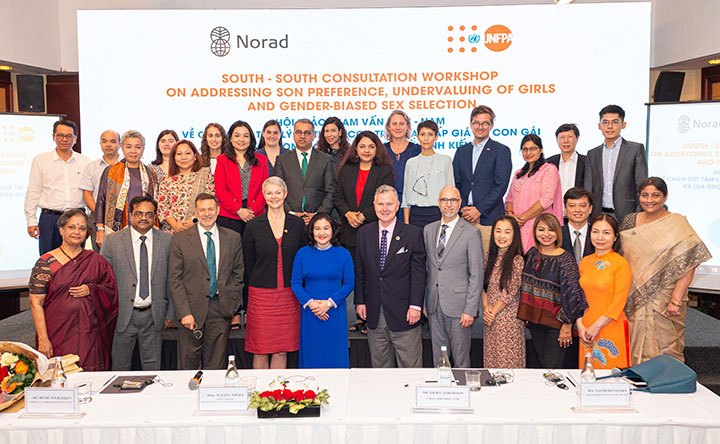NEWS DESK
HANOI / BANGKOK: In many nations in Asia, the Balkans, and the Caucasus, as well as in Africa, the preference for having a son continues to be a persistent form of gender inequality and discrimination. According to the State of World Population Report published by the United Nations Population Fund (UNFPA) in 2020, globally, more than 140 million females are considered ‘missing’ due to the preference of sons over daughters.
UNFPA organized a policy dialogue with decision-makers, experts, and civil society representatives from eight countries, including Armenia, Azerbaijan, Bangladesh, China, Georgia, India, Nepal, and Vietnam, in an effort to promote coordinated efforts to address son preference and gender-biased sex selection. The workshop, taking place in Hanoi, Vietnam, from 4- 6 October, also saw the participation of ambassadors and representatives from Australia, Canada, Norway, and Sweden.
“Son preference and gender-biased sex selection are, first and foremost, an issue of gender inequality and a violation of human rights,” said Bjorn Andersson, Regional Director for UNFPA Asia and the Pacific. “We must address social norms that diminish the value of girls and women, and support national and community efforts which strive to address preference for sons and sex selection. It is encouraging to see many experts and government officials, as well as civil society representatives coming together to share their knowledge and learnings. The gathering also reinforces the importance of south-south collaboration in promoting gender equality and rights, and ending gender-based discrimination and harmful practices,” added Mr. Andersson.
Gender-biased sex selection has far-reaching harmful and negative impacts on societies including increased maternal deaths, sexual violence, imbalanced sex ratios, and human trafficking. UNFPA’s response focuses on tackling gender inequality – the root cause of son preference – by working with partners at all levels, from policy makers to individuals and communities, to bring about behaviour and policy change.
Speaking at the opening session yesterday, the Vice Minister of Labour, Invalids and Social Affairs (MOLIA) in Vietnam, Mme Nguyen Thi Ha, said, “In Vietnam, gender equality is a cross-cutting issue in all the guidelines of the Party and State of Vietnam and is part of the country’s socio-economic development strategy which aims to build Vietnam into a prosperous, democratic, and fair country, thus ensuring national security and sustainable development. Vietnam has issued policies and legal frameworks as well as many solutions and interventions to address gender-biased sex selection.”
In her opening remarks, Ambassador Hilde Solbakken, Norwegian Ambassador to Vietnam, said: “Norway gives high priority in its development policies to strengthening and defending global norms against harmful practices and promoting the rights of girls and women. We are proud to support UNFPA’s Global Programme to Prevent Son Preference and the Undervaluing of Girls and we are very pleased to work together with MOLISA and UNFPA in addressing this issue in Vietnam.”
On the third-day of the gathering, the participants will visit the Bac Giang province to learn how the Vietnam Farmers’ Union is tackling gender-biased sex selection through the ‘Fatherhood Programme’, a UNFPA-supported innovative strategy to engage young men in building healthy family relationships in the country.
“We have clearly created a movement by setting up policy and legal frameworks, introducing innovative and communication activities geared towards behavioural change driven by young people, and providing integrated services.” said Naomi Kitahara, UNFPA Representative in Vietnam. “This is one of the best partnerships I have seen between the Government, development partners, civil society organizations and UNFPA, working together to achieve a common objective in addressing gender-biased sex selection.”
UNFPA has been at the forefront of efforts to end the practice of gender-biased sex selection in Asia since 1994, as part of its work to tackle gender-biased harmful practices, including child marriage, female genital mutilation and son preference, which are all interconnected and are manifestations of deep-rooted gender inequalities and discrimination.
With financial contributions from the European Union and Norway, UNFPA has supported the development and strengthening of evidence-based national strategies, policies and programmes to address son preference and gender inequality across Asia and the Caucasus, including activities that foster South-South collaboration and shared learning across nations.








